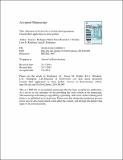| dc.contributor.author | Rodrigues, Joana L. | |
| dc.contributor.author | Sousa, Marta | |
| dc.contributor.author | Kluskens, Leon D. | |
| dc.contributor.author | Rodrigues, Ligia R. | |
| dc.contributor.author | Prather, Kristala L. Jones | |
| dc.date.accessioned | 2016-02-23T19:36:41Z | |
| dc.date.available | 2016-02-23T19:36:41Z | |
| dc.date.issued | 2014-08 | |
| dc.date.submitted | 2014-07 | |
| dc.identifier.issn | 01681656 | |
| dc.identifier.uri | http://hdl.handle.net/1721.1/101238 | |
| dc.description.abstract | The mechanism of heat shock response of Escherichia coli can be explored to program novel biological functions. In this study, the strongest heat shock promoters were identified by microarray experiments conducted at different temperatures (37 °C and 45 °C, 5 min). The promoters of the genes ibpA, dnaK and fxsA were selected and validated by RT-qPCR. These promoters were used to construct and characterize stress probes using green fluorescence protein (GFP). Cellular stress levels were evaluated in experiments conducted at different shock temperatures during several exposure times. It was concluded that the strength of the promoter is not the only relevant factor in the construction of an efficient stress probe. Furthermore, it was found to be crucial to test and optimize the ribosome binding site (RBS) in order to obtain translational efficiency that balances the transcription levels previously verified by microarrays and RT-qPCR. These heat shock promoters can be used to trigger in situ gene expression of newly constructed biosynthetic pathways. | en_US |
| dc.description.sponsorship | Fundacao para a Ciencia e a Tecnologia (Project FCOMP-01-0124-FEDER-027462) | en_US |
| dc.description.sponsorship | Fundacao para a Ciencia e a Tecnologia (Project PEst-OE/EQB/LA0023/2013) | en_US |
| dc.description.sponsorship | Fundacao para a Ciencia e a Tecnologia (Project NORTE-07-0124-FEDER-000028) | en_US |
| dc.description.sponsorship | Fundacao para a Ciencia e a Tecnologia (Project NORTE-07-0124-FEDER-000027) | en_US |
| dc.description.sponsorship | Fundacao para a Ciencia e a Tecnologia (Grant SFRH/BD/51187/2010) | en_US |
| dc.description.sponsorship | Fundacao para a Ciencia e a Tecnologia (SYNBIOBACTHER Project PTDC/EBB-BIO/102863/2008) | en_US |
| dc.language.iso | en_US | |
| dc.publisher | Elsevier | en_US |
| dc.relation.isversionof | http://dx.doi.org/10.1016/j.jbiotec.2014.08.005 | en_US |
| dc.rights | Creative Commons Attribution-NonCommercial-NoDerivs License | en_US |
| dc.rights.uri | http://creativecommons.org/licenses/by-nc-nd/4.0/ | en_US |
| dc.source | Prof. Prather | en_US |
| dc.title | Selection of Escherichia coli heat shock promoters toward their application as stress probes | en_US |
| dc.type | Article | en_US |
| dc.identifier.citation | Rodrigues, Joana L., Marta Sousa, Kristala L.J. Prather, Leon D. Kluskens, and Ligia R. Rodrigues. “Selection of Escherichia Coli Heat Shock Promoters Toward Their Application as Stress Probes.” Journal of Biotechnology 188 (October 2014): 61–71. | en_US |
| dc.contributor.department | MIT-Portugal Program | en_US |
| dc.contributor.department | Massachusetts Institute of Technology. Department of Chemical Engineering | en_US |
| dc.contributor.approver | Prather, Kristala L. Jones | en_US |
| dc.contributor.mitauthor | Rodrigues, Joana L. | en_US |
| dc.contributor.mitauthor | Prather, Kristala L. Jones | en_US |
| dc.contributor.mitauthor | Rodrigues, Ligia R. | en_US |
| dc.relation.journal | Journal of Biotechnology | en_US |
| dc.eprint.version | Author's final manuscript | en_US |
| dc.type.uri | http://purl.org/eprint/type/JournalArticle | en_US |
| eprint.status | http://purl.org/eprint/status/PeerReviewed | en_US |
| dspace.orderedauthors | Rodrigues, Joana L.; Sousa, Marta; Prather, Kristala L.J.; Kluskens, Leon D.; Rodrigues, Ligia R. | en_US |
| dc.identifier.orcid | https://orcid.org/0000-0003-0437-3157 | |
| mit.license | PUBLISHER_CC | en_US |
